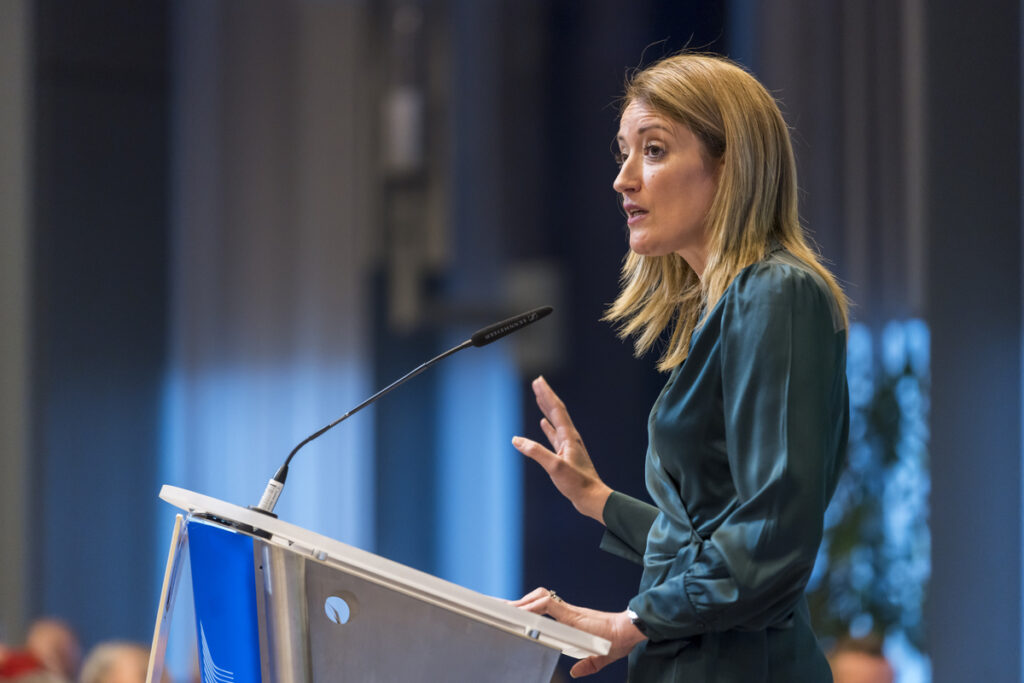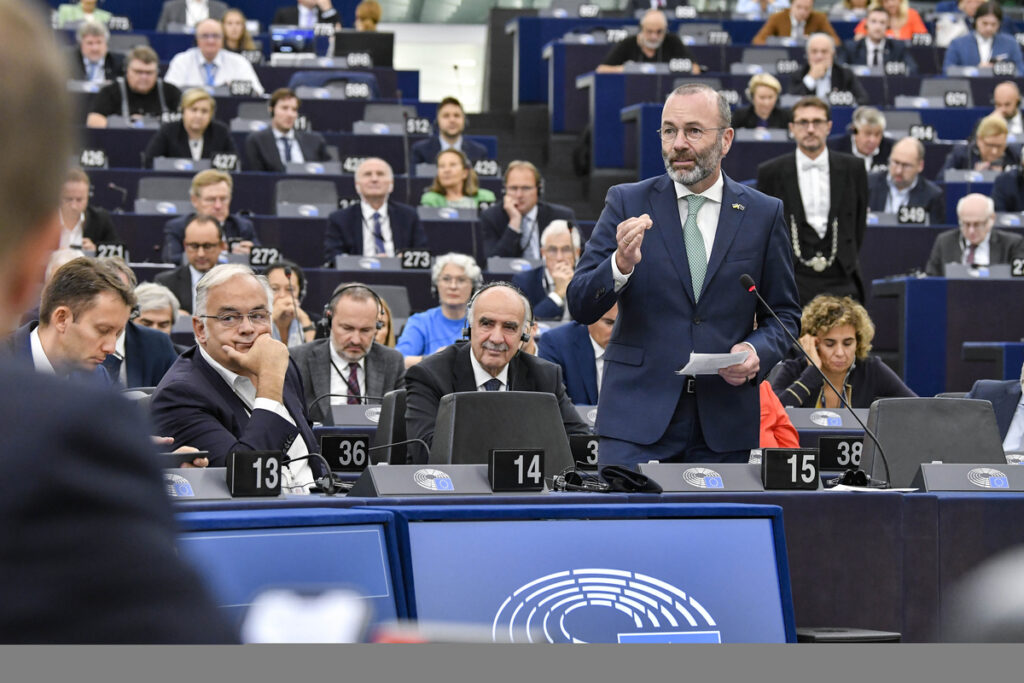
Blog: Are the European Parliament’s political groups free from gender-based biases and discrimination?
The European Parliament is the only institution of the European Union directly elected by the citizens of the EU Member States. Since 1979, it has been elected by universal suffrage for a five-year period, giving it a mandate and legitimacy not enjoyed by other EU institutions. According to the founding treaties of the EU, it has legislative, budgetary, and supervisory powers.
The legislative power of the European Parliament means that together with the representatives of the Council of the European Union, it is responsible for adopting EU legislation. The Members of the European Parliament draw up reports on proposals for ‘legislative texts’ presented by the European Commission. After that, the parliamentary committees vote on them and, when needed, amend them. When the texts have been revised and adopted in plenary, Parliament adopts its position. Even though it is widely known that the legislative initiative in the EU belongs to the European Commission, according to the Treaty of Maastricht enhanced by the Lisbon Treaty, the European Parliament has a right of legislative initiative that allows it to ask the Commission to submit a proposal. Hence, while studying the issue of gender equality in the EU, one should pay particular attention to the internal trends and stand of the European Parliament on the matter, dynamics, policies and practices that influence the policy-making process and, as a result, the legislation on gender equality adopted by the European Parliament.
Currently, the European Parliament consists of 705 Members (MEPs), more than a third of them (39.3%) women, a higher proportion than in most national parliaments in EU Member States. Moreover, there have been significant changes in the leadership of the European Parliament over the past years: since January 2022, the Parliament is presided over by a woman, Roberta Metsola, while eight of the 14 vice-presidents are women, and eight of the 22 committee chairs are also women.

The MEPs are organised not by nationality, but by political affiliation and sit in political groups, which means that political groups have a big impact on both formal and informal politics, norms, and rules created in and supported by the European Parliament. For instance, before the voting in plenary, political groups scrutinise the reports drawn up by the parliamentary committees and propose amendments to them.
There are currently seven political groups in the European Parliament. Looking at their leadership, we can see that the number of women there is quite low compared to the number of women MEPs in general. Only one out of the seven political groups in the European Parliament is led by a woman solely (the S&D group), two political groups have shared leadership between a woman and a man (the Greens/EFA and GUE/NGL groups), and four political groups are presided over by men, generally reflecting the position of those political groups in terms of the gender equality issue: while some political groups publicly proclaim gender equality as one of their main values (e.g., the Greens/EFA group), others prefer to ignore it and/or oppose any positive changes in this regard (the ECR and ID groups).
On 7 February 2023, the ‘Gender equality in the political groups: Pushing the agenda forward’ event organised by the ‘Gender, party politics and democracy in Europe: A study of European Parliament’s party groups’ (EUGenDem) project took place in the European Parliament. It included a presentation of key findings on gender equality in the political groups in the European Parliament prepared by the EUGenDem project, and a high-level roundtable ‘Debating gender equality in the political groups’ with MEPs representing different political groups. The event got a lot of attention from other MEPs, their assistants, political consultants, and representatives of civic society and academia, and the conference room was at full capacity.
The EUGenDem project is a major European Research Council-funded scientific research project, which provides a systematic analysis of the gendered policies and practices of the political groups in the European Parliament. It has gathered one of the largest qualitative data sets on the European Parliament’s political groups: 140 research interviews with MEPs and political group staff were conducted, a parliamentary ethnography was carried out, and a document archive was analysed. The research has led to over 70 scientific publications so far. The key findings of the project are the following:
- the good external reputation of the European Parliament as a promoter of gender equality does not always translate equally into good internal practices;
- gendered inequalities persist, from outright gender-based discrimination to subtle forms of inequality;
- there is no political group free from gender-based biases or discrimination, each of them has to do its own work to identify and address the most relevant gendered inequalities;
- the biggest shared challenge is the uneven and informal nature of measures used to advance gender equality.
The forms of gendered inequalities that exist in the political groups vary from sexist and racist language to sexual harassment, and manifest themselves in the gendered leadership structures, the dominance of masculine culture, the gendered interaction and expertise, and the opposition to gender equality and intersectionality. For example, the ECR and ID groups have conservative and traditional views and show direct and indirect opposition to gender equality. The EPP group can be characterised by a male dominance in leadership, a masculine group culture, and a ‘sitting on the fence’ position on gender equality policies. As for the Renew group, the emphasis on individual choice and merit works against the recognition of inequalities. The self-image of the S&D group hampers the recognition of gendered biases and its national delegations’ leadership is dominated by men. The analysis of the Greens/EFA and Left groups shows that they have gendered interaction and expertise, the first has far-reaching formal practices to advance equality, and the second has far-reaching informal practices, while both formal and informal practices are equally important.
In this respect, it is important to highlight the way political groups deal with the opposition to gender equality. The latter can be categorised as direct or indirect opposition. Direct opposition is loud and clear. It includes claims that are sexist and misogynistic during speeches or in amendments. Direct opposition can be easily traced during debates on issues such as sexuality, reproductive rights, or gender-based violence. Indirect forms of opposition are more difficult to tackle. These are often hidden behind other goals or narratives, such as Euroscepticism, subsidiarity, and redundancy with national laws. The way political groups in the European Parliament approach the issue of opposition to gender equality differs a lot. Some of them (the Greens/EFA, Left, S&D and Renew groups) support gender equality and tackle the opposition to it. The extent to which they are ready to do it varies, but, in general, these groups might be referred to as the defenders of gender equality. On the opposite side, some political groups (the ECR and ID groups) tend to reframe or oppose gender equality with anti-gender, religious and anti-EU arguments. The EPP group neither actively supports gender equality nor opposes it directly (the ‘sitting on the fence’ strategy). It has strong internal tensions, although the research shows that all groups have important internal tensions and some form of opposition to gender equality exists also in groups that formally support equality.

As the European Parliament has legislative powers and political groups play an important role in this process, it is essential to look into the political group policy-making as a matter of the democratic legitimacy of the European Parliament and the EU. In general, political groups’ policy-making practices vary: the EPP, S&D, and Renew groups are more hierarchical and closed, the Greens/EFA group is relatively open and non-hierarchical, and for the ECR, ID, and Left group, a common position is less important. Yet, informality plays a significant role in policy-making for all political groups, which leads to reduced transparency. As a result, there are huge differences in practices and understandings of gender mainstreaming between groups, including formal and informal practices: rules, procedures and resources.
Finally, intersectionality is one of the aspects that is hugely overlooked by the political groups in the European Parliament: none of the political groups placed fighting racism at the heart of their politics, none had significant internal practices for combating racism or promoting antiracism, the entire self-construction of the Parliament tended toward deflecting the topic, by moving the focus regarding racism to the member-state level or other European institutions, while protecting the progressive institutional reputation of the Parliament. Zooming in, we discover that the S&D, Greens/EFA, and Left groups demonstrated an awareness of the lack of representation of racialised minorities, but antiracism is not at the core of their identity (these groups construct racism as a problem of only far-right groups). The ECR, Greens/EFA and ID show more proactivity, they discuss racism but simultaneously they engage in practices of deflection and denial to refute accusations of being racist (sometimes, they deny the existence of racism altogether). Ultimately, the EPP and Renew groups contain few references to race and racism, but the genuine reason for having them might be questioned.
Ultimately, the findings of the research conducted by the EUGenDem project prove that better policy-making and enhanced democracy in the European Parliament can be reached by tackling inequalities at the political group level which includes the advancement of formal binding measures (gender equality is not ‘organic’), learning from other groups (training, gender mainstreaming, ombudspersons, effective informal practices), and ensuring the implementation of best practices.
Author: Liliia Antoniuk, Young European Ambassadors in Ukraine National Coordinator.
LATEST

How you can help the planet every day

Building Europe: Poland’s experience of joining the European Union and lessons for Ukraine

World Health Day 2024: My Health, My Right

EUREKA MEETS EUROPE – opportunities to develop and study. My experience

Can you wear pink in the workplace?
More campaign pages:
Interested in the latest news and opportunities?
This website is managed by the EU-funded Regional Communication Programme for the Eastern Neighbourhood ('EU NEIGHBOURS east’), which complements and supports the communication of the Delegations of the European Union in the Eastern partner countries, and works under the guidance of the European Commission’s Directorate-General for Neighbourhood Policy and Enlargement Negotiations, and the European External Action Service. EU NEIGHBOURS east is implemented by a GOPA PACE-led consortium. It is part of the larger Neighbourhood Communication Programme (2020-2024) for the EU's Eastern and Southern Neighbourhood, which also includes 'EU NEIGHBOURS south’ project that runs the EU Neighbours portal.

The information on this site is subject to a Disclaimer and Protection of personal data. © European Union,